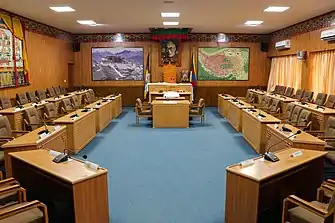Tibet Policy and Support Act
The Tibet Policy and Support Act is a federal law that outlines United States policy on Tibet.
.svg.png.webp) | |
| Legislative history | |
|---|---|
|

Legislative history
On January 28, 2020, the bill passed the US House of Representatives by a vote of 392–22.[1][2][3]
On May 14, 2020, the United States Senate Committee on Foreign Relations was to discuss the bill.[2][4]
On December 21, 2020, the bill was approved by the U.S. Congress as an amendment to the Consolidated Appropriations Act, 2021.[5]
Legislation
The Tibetan Policy and Support Act would make it official United States policy that the succession of Tibetan Buddhist leaders, including the succession of the Dalai Lama, be left solely to Tibetan Buddhists to decide, without interference from the Chinese government. Chinese officials that interfere in the process of selecting Tibetan Buddhist leaders would be subject to sanctions under the Global Magnitsky Act, including denial of entry into the United States. The bill also calls for the creation of a new US consulate in Lhasa, the capital of the Tibet Autonomous Region.[4]
Reactions
Domestic
The United States Commission on International Religious Freedom (USCIRF) commended the US House of Representatives for passing the act, which the USCIRF had previously endorsed.[3]

Jim McGovern, Chair of the Tom Lantos Human Rights Commission and the Congressional-Executive Commission on China commented, "We are criticizing the Chinese Communist Party (CCP) and not the Chinese people, who are also suffering under China’s repression,... We stand in solidarity with the Tibetan people and revere His Holiness the Dalai Lama. We all are in this together and we expect the President to sign the Tibet Policy and Support Act into law soon."[8]
Central Tibetan Administration
Lobsang Sangay, Sikyong (President) of the Tibetan government-in-exile and graduate of the Harvard Law School, thanked the Government of the United States and the US House for passing The Tibetan Policy and Support Act.[9]
China
Hua Chunying, China's Foreign Ministry spokesperson, said that the act severely violates the basic norms governing international relations and was the latest attempt to interfere in China's domestic affairs.[10]
See also
References
- Haley Byrd (28 January 2020). "House passes Tibet human rights bill". CNN. Retrieved 18 May 2020.
- "Why there are two Panchen Lamas, and one is missing". The Economist. 14 May 2020. Retrieved 18 May 2020.
- "USCIRF Welcomes Passage of the Tibetan Policy and Support Act in House of Representatives". United States Commission on International Religious Freedom. 30 January 2019. Retrieved 18 May 2020.
- Haley Byrd (14 May 2020). "Senate approves Uyghur human rights bill". CNN. Retrieved 17 May 2020.
- Owen Churchill (22 December 2020). "Tibet bill passes Congress after being added to US spending bill". South China Morning Post. Retrieved 22 December 2020.
- "U.S. bolsters support for Taiwan and Tibet, angering China". Reuters. 2020-12-28. Retrieved 2020-12-28.
- "Trump signs Tibet policy to preempt Chinese move on Dalai Lama's succession". The Tribune. December 28, 2020. Retrieved December 28, 2020.
- Joshua Lipes (3 June 2020). "Top US Religious Official Pledges Support For Dalai Lama's Return to 'More Autonomous' Tibet". Radio Free Asia. Retrieved 8 June 2020.
- "Press Conference on the passage of The Tibetan Policy and Support Act". TibetTV. 30 January 2020. Retrieved 18 May 2020 – via YouTube.
- "Foreign Ministry Spokesperson Hua Chunying's Remarks on the US House of Representatives Passing the Tibetan Policy and Support Act of 2019". Ministry of Foreign Affairs of the People's Republic of China. 29 January 2020. Retrieved 21 May 2020.